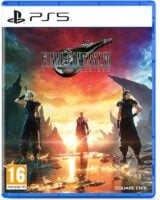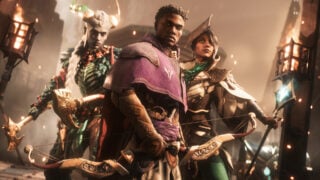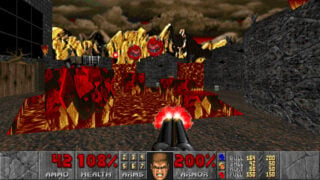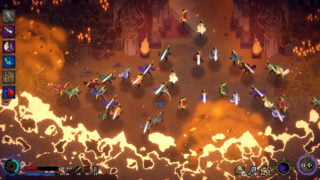Surprising snubs & rising indie stars: BAFTA chair unpacks the 2025 Games Awards shortlist
BAFTA discusses the surprising Metaphor and Final Fantasy snub, plus surprise hit Thank Goodness You’re Here
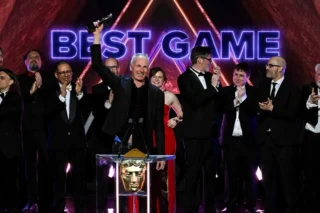
The chair of BAFTA’s Games committee has discussed the big winners and losers in this year’s nominations shortlist, including the surprising absence of Final Fantasy 7 Rebirth and Metaphor: ReFantazio in its biggest categories.
The 2025 BAFTA Games Awards nominations were announced on Tuesday, with Xbox’s Senua’s Saga: Hellblade 2 leading with 11 nominations, followed by PlayStation’s Astro Bot, and The Chinese Room’s Still Wakes the Deep with eight each.
The big surprise is British indie comedy Thank Goodness You’re Here, which has a total of seven nominations. But there are also surprise absentees in the big categories, namely last year’s pair of big RPGs – two of the leading nominees at The Game Awards – which receive just two BAFTA nominations each.
Ahead of Tuesday’s announcement, we asked Games chair Tara Saunders about the surprise snubs and inclusions, and how BAFTA’s judging system is managed.
“It’s a really robust process. I can say that because I’ve been part of it now for many years and I love how fair and transparent it is that we can have basically our whole voting membership,” she told VGC.
“We have 1300 games voting members that all vote in the BAFTA Games Awards. They take that responsibility very seriously, is what I would say. If you’re in there on the BAFTA Discord, they’re always talking about their responsibility as jurors. And I think they come into that as peers voting on peer content. I think that makes it exceptionally strong.
“And then the process around that is very robust. All entries are grouped together into their entered categories and judged by the whole of the games voting members. And there’s a top 10 in each category which is then long listed, which we announced publicly in December.
“This year for the first time, for game design and technical achievement categories we actually had specialist peers in our in our awards voting on those things. And I think it makes a huge difference because it’s not just about games that you’ve heard of.

“It’s actually about the ones that people are respectfully looking at within their crafts and disciplines. And I think that’s where you start to see those games that may be overlooked in the public eye kind of getting lifted up. And then this is BAFTA putting them on the public stage. And I think that’s really strong.”
On Final Fantasy 7 Rebirth, Saunders explained that remakes and remasters of games released in previous years are not eligible for consideration in BAFTA’s biggest categories, outside of ‘craft’ awards like audio and technical achievement.
“Just talking technically, Final Fantasy, for example, is eligible in the craft categories, as we call them. For Best Game, we don’t allow remakes, and that is a point of differentiation for us.”
She added: “That’s about us keeping BAFTA Game Awards into making sure we’re rewarding current titles. It doesn’t mean that we discount those games at all – actually, far from it, which is why they go into the more technical craft categories, so they’re eligible for all of those – we just keep it for new IP and new games that haven’t necessarily seen a release before.”
As for other surprising omissions and inclusions compared to the other big game awards events, Saunders said she believed it was a result of the strong diversity among its voting and jury members, which she believes allows BAFTA to showcase a broader slice of the video games industry.
“As you can see from the Best Game category, there is a real blend of things in there, and I think that’s just representative of the diversity of our games membership,” she said. “There’s been a lot of work over the years, and the games membership is now very broad, very diverse, very global. And I think, I think this year’s nominations are actually a real slice of the industry.

“They actually represent the industry and the various types of content, both big and small, quite well together. It goes different ways in different years, but I think this year is exceptionally, you know, it’s got strong British representatives, strong international representation. It’s got exceptional small titles that are made by one or two people, going up against huge teams. And I think this is what is special about the awards.
“I don’t know how it happens. It’s peer voted by a very strong games membership, and I think that’s what makes it so good. Plus, the jury process is exceptionally strong. We’ve got very specialist juries pushing against each other and giving different opinions, which really makes it a very, very robust process, actually. So the games that come out on top are well deserving of those of those nominations.”
In what’s been a difficult few years for games industry workers, with closures and redundancies commonplace, Saunders said she believes BAFTA can provide a welcome celebration of the artform and those who work within it.
“I think the awards is a celebration of the very best in games globally, whether that’s big or small,” she explained. “I do think the awards are like a bit of a beacon of light in the recent darkness that the industry’s experienced. I think it’s really important that we celebrate the teams and individuals that have crafted these standout game experiences, whether they’re big or small.
“There’s something for everyone in the games awards this year in our awards. I think if you look at the variety of titles, I actually do think for probably one of the first years, there’s something that everyone could kind of appeal to and play. And I think that’s what’s made this year very special.”
The winners will be announced at the 21st BAFTA Games Awards in London on Tuesday, April 8, which will stream live at 19.00 BST / 14.00 ET / 11.00 PT on BAFTA’s YouTube and Twitch.
